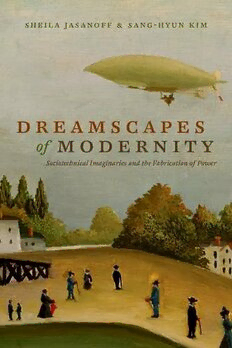
Dreamscapes of Modernity: Sociotechnical Imaginaries and the Fabrication of Power PDF
Preview Dreamscapes of Modernity: Sociotechnical Imaginaries and the Fabrication of Power
Dreamscapes of Modernity Dreamscapes of Modernity Sociotechnical Imaginaries and the Fabrication of Power EDITED BY SHEILA JASANOFF AND SANG- HYUN KIM The University of Chicago Press Chicago and London Sheila Jasanoff is the Pforzheimer Professor of Science and Technology Studies at the Harvard Kennedy School. Sang- Hyun Kim is associate professor at the Research Institute of Comparative History and Culture at Hanyang University in Korea. The University of Chicago Press, Chicago 60637 The University of Chicago Press, Ltd., London © 2015 by The University of Chicago All rights reserved. Published 2015. Printed in the United States of America 24 23 22 21 20 19 18 17 16 15 1 2 3 4 5 ISBN- 13: 978- 0- 226- 27649- 6 (cloth) ISBN- 13: 978- 0- 226- 27652- 6 (paper) ISBN- 13: 978- 0- 226- 27666- 3 (e- book) DOI: 10.7208/chicago/9780226276663.001.0001 Library of Congress Cataloging- in- Publication Data Dreamscapes of modernity : sociotechnical imaginaries and the fabrication of power / edited by Sheila Jasanoff and Sang- Hyun Kim. pages cm Includes bibliographical references and index. ISBN 978- 0- 226- 27649- 6 (cloth : alk. paper) — ISBN 978- 0- 226- 27652- 6 (pbk. : alk. paper) — ISBN 978- 0- 226- 27666- 3 (e- book) 1. Science—Social aspects. 2. Technological innovations—Social aspects. I. Jasanoff, Sheila. II. Kim, Sang- Hyun, 1967– Q175.5.D74 2015 303.48'3—dc23 2014050176 ♾ This paper meets the requirements of ANSI/NISO Z39.48- 1992 (Permanence of Paper). CONTENTS sheila jasanoff ONE / Future Imperfect: Science, Technology, and the Imaginations of Modernity / 1 william kelleher storey TWO / Cecil Rhodes and the Making of a Sociotechnical Imaginary for South Africa / 34 michael aaron dennis THREE / Our Monsters, Ourselves: Reimagining the Problem of Knowledge in Cold War America / 56 warigia bowman FOUR / Imagining a Modern Rwanda: Sociotechnical Imaginaries, Information Technology, and the Postgenocide State / 79 ulrike felt FIVE / Keeping Technologies Out: Sociotechnical Imaginaries and the Formation of Austria’s Technopolitical Identity / 103 j. benjamin hurlbut SIX / Remembering the Future: Science, Law, and the Legacy of Asilomar / 126 sang-h yun kim SEVEN / Social Movements and Contested Sociotechnical Imaginaries in South Korea / 152 suzanne moon EIGHT / Building from the Outside In: Sociotechnical Imaginaries and Civil Society in New Order Indonesia / 174 joshua barker NINE / Guerilla Engineers: The Internet and the Politics of Freedom in Indonesia / 199 nancy n. chen TEN / Consuming Biotechnology: Genetically Modified Rice in China / 219 regula valérie burri ELEVEN / Imaginaries of Science and Society: Framing Nanotechnology Governance in Germany and the United States / 233 elta smith TWELVE / Corporate Imaginaries of Biotechnology and Global Governance: Syngenta, Golden Rice, and Corporate Social Responsibility / 254 clark a. miller THIRTEEN / Globalizing Security: Science and the Transformation of Contemporary Political Imagination / 277 andrew lakoff FOURTEEN / Global Health Security and the Pathogenic Imaginary / 300 sheila jasanoff FIFTEEN / Imagined and Invented Worlds / 321 Acknowledgments / 343 Contributor Biographies / 345 Index / 347 ONE Future Imperfect: Science, Technology, and the Imaginations of Modernity SHEILA JASANOFF Technological innovation often follows on the heels of science fiction, lag- ging authorial imagination by decades or longer. One hundred fifty years passed between the youthful Mary Shelley’s fantastic story of a vengeful crea- ture brought to life by Dr. Frankenstein and the production of new life forms in twentieth- century biological laboratories (Shelley 2008 [1818]). Jules Verne’s Nautilus, piloted by Captain Nemo, took to the ocean depths well before real submarines went on such long or distant voyages (Verne 1887). At the dawn of the Progressive Era, the American socialist Edward Bellamy (1889) foresaw an economy fueled by rapid communication, credit cards, and in- home delivery of goods; a hundred years on, those imagined revo- lutions have become routine. Aldous Huxley (1932) fantasized about an as- sembly line of artificial human reproduction to serve state purposes twenty years before the unraveling of the structure of DNA, which in turn paved the way for the currently forbidden cloning of human beings. Arthur C. Clarke (1968) created the scheming, lip- reading computer Hal thirty years before IBM programmers developed Deep Blue to beat chess master Gary Kasparov at his own game. And interplanetary travel was in the minds of such writers as H.G. Wells, Fred Wilcox, and Fred Hoyle appreciably before Neil Arm- strong stepped onto the moon with his “giant leap for mankind.” Belying the label “science fiction,” however, works in this genre are also fabulations of social worlds, both utopic and dystopic. Shelley’s lab- generated monster turns murderous because he is excluded from society by his abnormal birth and hence is denied the blessings of companionship and social life enjoyed by his creator. Jules Verne’s Nemo, a dispossessed Indian prince driven by hatred of the British colonialists who exploited his land and destroyed his family, seeks freedom and scientific enlightenment in the ocean depths. Biopower runs amok in Aldous Huxley’s imagined
